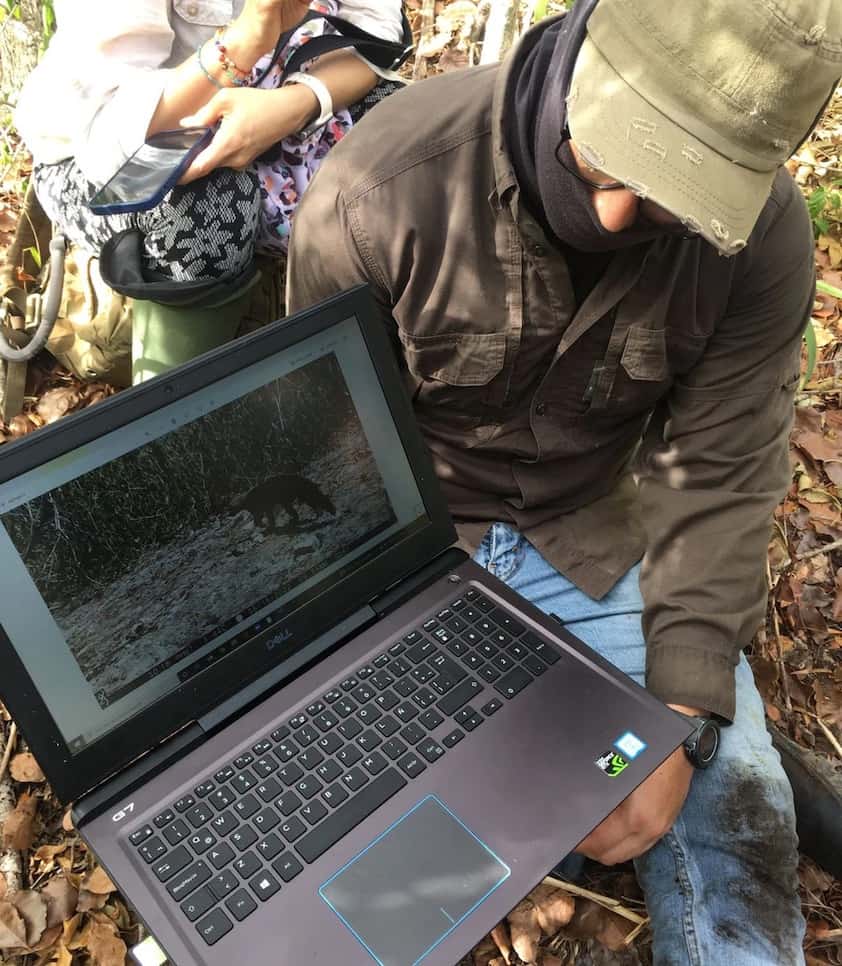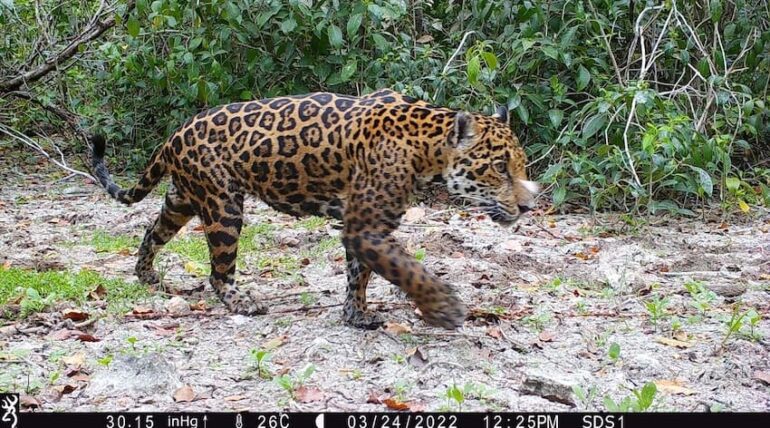TL;DR:
- Conservationists have used AI technology to discover jaguars in the Dzilam de Bravo reserve in Yucatán.
- The Tech4Nature Mexico project identified five jaguars through camera traps and an integrated AI monitoring system.
- The project collected over 30,000 images and 550,000 sound recordings to track animals in the wild.
- The presence of jaguars in the reserve is a significant achievement for the project.
- Data from the monitoring is crucial for supporting conservation efforts.
- Mexico is estimated to have 4,000-5,000 wild jaguars, with half of them in the Yucatán Peninsula.
- Jaguars are threatened by deforestation, hunting, and climate change.
- The Tech4Nature project is supported by Huawei and utilizes recycled cell phones for data collection.
- Collaborators include the Sustainable Development Ministry, AI for Climate initiative, and local communities.
- The project achieved a 90% accuracy rate in identifying individual jaguars.
- The second phase of the project focuses on identifying other species and developing conservation strategies.
Main AI News:
In a groundbreaking development, a team of dedicated conservationists has achieved a significant milestone by uncovering the presence of jaguars in the pristine Dzilam de Bravo natural reserve located in Yucatán. Leveraging state-of-the-art artificial intelligence technology, the Tech4Nature Mexico project has successfully identified five of these majestic creatures within the reserve’s confines. The team, in conjunction with an integrated AI monitoring system, employed a network of camera traps strategically placed throughout the area to accomplish this remarkable feat.
Over the course of the past year, the project meticulously amassed an extensive collection of more than 30,000 images and 550,000 sound recordings. This treasure trove of data was then expertly processed through the cutting-edge ModelArts and Arbimon AI platforms, seamlessly managed by the esteemed NGO Rainforest Connection. The utilization of these advanced technologies enabled researchers to diligently monitor and track the movement of various wildlife species within their natural habitat.
Throughout their endeavor, the team diligently cataloged an impressive array of 119 avian, mammalian, reptilian, and amphibian species, 34 of which have been classified as endangered. However, the undeniable highlight of the project thus far lies in the undeniable evidence of the presence of jaguars within the Dzilam Bravo reserve. This monumental discovery has the potential to revolutionize the conservation landscape, as it provides invaluable knowledge crucial to preservation efforts.
Sayda Rodríguez, Yucatán’s Minister of Sustainable Development, expressed the immense value of this newfound knowledge, stating, “The insights gained through our monitoring efforts are of immeasurable importance. Without the ability to observe and comprehend these aspects of wildlife behavior, our understanding would remain woefully incomplete.” Rodríguez further emphasized the crucial role this data plays in supporting and bolstering conservation initiatives.
The plight of the jaguar in Mexico is a matter of great concern among environmentalists, who estimate their population to be between 4,000 and 5,000, with approximately half residing in the Yucatán Peninsula. While there has been a modest increase in the number of identified jaguars from 4,025 in 2010 to 4,766 in 2018, these remarkable felines still face grave threats in the form of deforestation, hunting, and the ever-pressing challenge of climate change.
Launched in early 2022, the Tech4Nature project has garnered immense support from the renowned Chinese smartphone manufacturer Huawei. Employing recycled 3G and 4G cell phones, the project collects invaluable information from the deployed cameras and sensors, seamlessly transmitting it to Huawei’s cutting-edge cloud center for analysis and storage.
This collaborative endeavor brings together esteemed partners such as the Sustainable Development Ministry, the AI for Climate initiative of C Minds, the Polytechnic University of Yucatán, the International Union for Conservation of Nature (IUCN), the NGO Rainforest Connection, and local communities in Dzilam de Bravo, collectively fostering an environment of excellence and innovation in the realm of wildlife monitoring.
Shortly after the project’s initiation, the first jaguars were promptly identified in the Dzilam de Bravo region. “The implementation of this groundbreaking technology has significantly expedited the process, reducing the time it would have otherwise taken years to accomplish,” stated Toshio Yokoyama, the director of management and conservation of natural resources at the Sustainable Development Ministry. Yokoyama further highlighted the uniqueness of each jaguar’s spot pattern, enabling individual identification with an impressive accuracy rate of 90%, further bolstering the project’s reliability.

A Tech4Nature conservationist shows a jaguar being tracked by a camera trap in the reserve. Source: Tech4Nature
Conlcusion:
The successful identification of jaguars in the Dzilam de Bravo reserve through the implementation of cutting-edge AI technology presents promising implications for the market. This breakthrough achievement not only highlights the capabilities of AI-driven solutions in wildlife conservation but also underscores the growing demand for advanced analytics in the environmental sector. The collaboration between conservationists, technology companies like Huawei, and various organizations signifies a potential market opportunity for innovative solutions that leverage AI and data-driven approaches to address pressing conservation challenges.
Furthermore, the project’s ability to collect extensive data on diverse wildlife species demonstrates the potential for market expansion in biodiversity monitoring and analysis services. The insights gained from this project can contribute to informed decision-making and support conservation efforts, potentially attracting investments and fostering growth in the emerging market segment of AI-powered environmental solutions.

